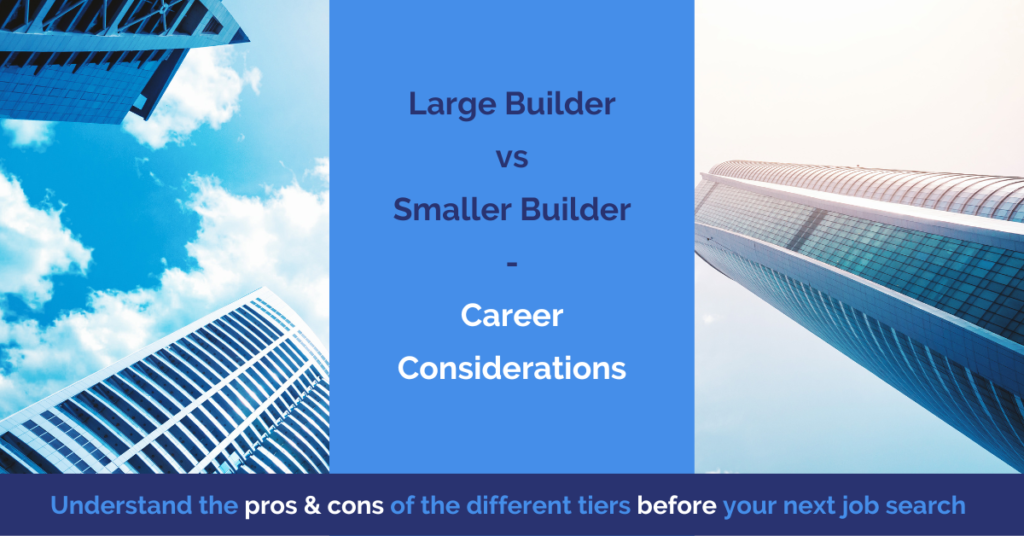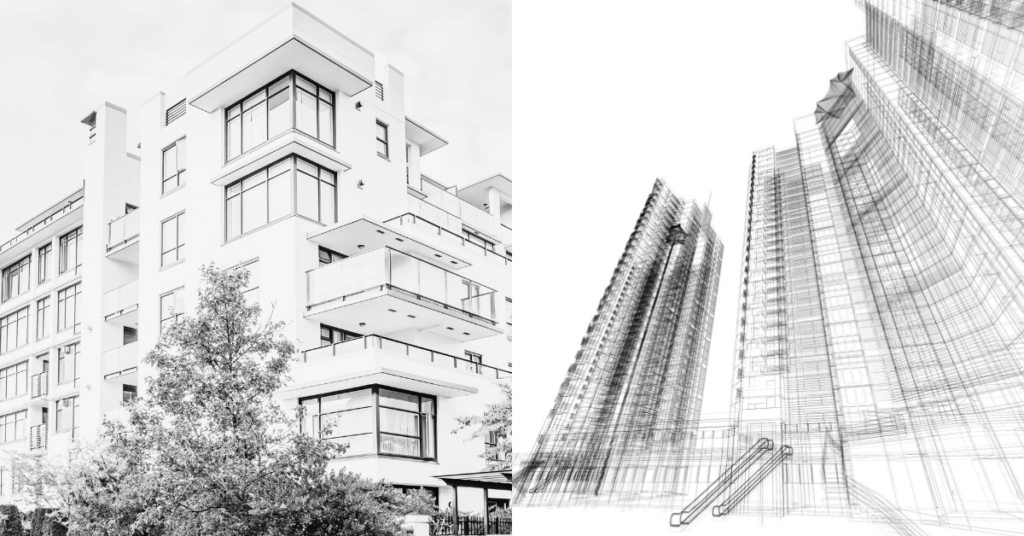It’s always good to factor into your job considerations the differences between working for a large builder vs a smaller builder. There are benefits to working in each, but it’s important to know what will work best for your personality and career goals.

That’s why, when we work with job seekers, we always advise that they understand what they want in terms of project size, type and organisational culture and then find an employer that suits them.
Below, we look at some of the general pros & cons of large and smaller builders.
Large Builder Pros
Better salaries
This is largely influenced by the variations in project size, type and responsibilities. So, if money is a key driver in your employment decision, this is something you should consider.
Job security
The projects are bigger and will generally provide you with strong job security as project timelines can run anywhere from 2-5 years.
In-depth experience
You can control a small part of a bigger process and gain an in-depth understanding of your role. Your focus will generally be on a centralised set of tasks providing the opportunity to build expertise in your chosen area of work.
Industry best practice
Larger builders employ state-of-the-art systems and technology, striving to achieve optimal results, rather than simply meeting minimum industry standards.
Training advantages
There‘s more access to both formal and informal training with larger builders, where you aren’t solely reliant on the skills and knowledge of a small group of people as with a smaller builder. Instead, you’ll be exposed to a wide range of individuals who can provide invaluable insights and expertise.
Large Builder Cons
Working longer days and weeks
This is due to the size, scope and complexity of the jobs being carried out.
The mundane
Working on the same build day in day out offers less diversity in work, which depending on personality type, some consider mundane.
Being pigeonholed
Working on a small part of the bigger process can create hurdles later if you decide to move into something different (eg. Finishes Foreman to Structures Foreman). It can also be challenging to progress in companies of this size (eg. CA to PM role etc) as there is a lot of perceived risk involved for a builder letting a first-time PM cut their teeth on a $100m + development.
Smaller Builder Pros
Wider construction exposure
Smaller builders offer greater project diversity and also exposure to a wider range of tasks and responsibilities which will broaden your skillset as you’ll be across the entire construction process beyond your own role. This means there’ll be less chance of being pigeonholed.
Mentoring
You’ll have greater access to a builder’s owners/directors, and usually, these business leaders are very willing to provide mentoring opportunities. This means you’ll have more of a say in business activities and the chance to gain a business understanding of the industry beyond the project build.
Increased work/life balance
Generally, the size and complexity of the jobs carried out by these builders are smaller and less technical with fewer control processes in the project delivery phase. Therefore, there is higher productivity, and the projects move at a quicker pace.
Career progression
Career progression is often more attainable as the perceived risk of letting a less experienced professional take the lead on a project isn’t as high in smaller builders, so the opportunity to progress is easier to come by.
Smaller Builder Cons
Less in-depth experience
There’ll be less exposure to one particular role. The old adage ‘jack of all trades, master of none’ comes to mind here which can hold you back if you’d like to move to a larger builder down the track.
Lower salary
In general, salaries are less competitive compared to larger builders, due to the smaller size, scope and complexity of the works being carried out. So, if salary is your key driver, you should factor this into your employment decision.
Limited large project exposure
If your goal is to deliver on large projects, you’ll eventually need to move on from the smaller builder space. Project experience in this dollar value range is something you’ll only find in your large builders.
Challenges with systems
Smaller builders often have limited financial resources to obtain current software and project management systems, which can result in basic systems and limited training resources. In these cases, training is often provided by the owner or a small group of individuals, who may not be effective at teaching the best methods for approaching your role.
Summary
Remember, there is no right or wrong employer. Your personality, preferences and career goals should drive who you work for. That’s why it’s crucial to understand the pros and cons of working in the different tiered builders before starting out your job search. What works for some won’t work for others.
Looking for your next construction job? Search our current construction roles here, or to chat with our team about securing your next opportunity, get in contact with us through our Contact Us page.
Receive our updates straight to your inbox




